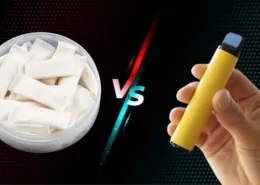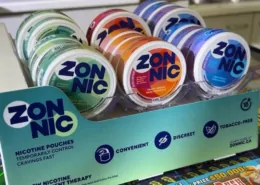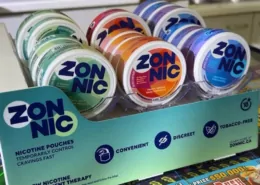Are Nicotine Pouches the New Vape Trends?
In a world where smoking cigarettes has lost its appeal, particularly among Generation Z, alternative nicotine products have been gaining traction. From Elf bars and Lost Marys to hookah pipes and even a resurgence in cigar and pipe smoking, young people are seeking new ways to satisfy their nicotine cravings. The latest addition to this list is the nicotine pouch, a small sachet of nicotine that users tuck under their lip, allowing the nicotine to be absorbed into their bloodstream.
Nicotine Pouch Usage on the Rise
While the use of nicotine pouches is still relatively uncommon in the UK, with only one in 300 adults using them, the trend is gradually gaining momentum. Popular brands like Velo and Nordic Spirit offer a range of flavors, such as “ice cool” and “bergamot wildberry,” appealing to a younger demographic. Notably, a report released by Polaris Market Research in October 2023 projects that the global nicotine pouch market will grow by $25.2 billion over the next decade.
Interestingly, the majority of nicotine pouch users are young men. Take Dylan, a 22-year-old who has been using nicotine pouches for a year. He initially tried them as a means to quit smoking and vaping. “I was out one night and my mate offered me one, so I thought ‘alright, I’ll give it a go’,” he explains. “Ever since then, I haven’t looked back.” Dylan has noticed improvements in his respiratory health since switching from cigarettes, and he finds pouches to be more cost-effective as well.
Similarly, Amir, 24, finds nicotine pouches to be less addictive than vaping or smoking. “The number I use in a day is easier to control than the amount I would smoke in a day,” he says. Jamie, 20, echoes this sentiment, having used pouches as a way to stop vaping, which he had initially started to quit smoking. “Vaping worked, but I was still inhaling stuff and coughing and I didn’t like the idea of that,” he explains. “I started using pouches because they’re a way to manage a nicotine addiction while staying as ‘healthy’ as possible.”
Understanding the Difference Between Snus and Nicotine Pouches
It’s important to note that in the UK, users often refer to these pouches as ‘snus,’ but there is a slight difference between the two. Harry Tattan-Birch, a researcher at UCL specializing in smoking, vaping, and behavioral science, clarifies, “Traditionally, ‘snus’ refers to pouches that contain ground-up tobacco which users place between their lip and gum. Modern nicotine pouches act in the exact same way, but do not contain ground tobacco leaf.”
While further research is needed to fully understand the long-term impacts of tobacco-free nicotine pouches, given their recent entry into the market, Tattan-Birch suggests that evidence from snus usage indicates that smokeless tobacco products are significantly safer than cigarettes. He points to the example of Sweden, where snus replaced cigarettes as the nicotine product of choice among Swedish men in the latter half of the 20th century, resulting in Swedish men having the lowest lung cancer rates in Europe.
Tattan-Birch also notes that the tobacco-free products that remain legal in the UK may be even safer than snus. “Toxicological studies show that [modern nicotine pouches] contain fewer toxicants and carcinogens than tobacco-containing snus,” he explains. However, he stresses the need for long-term evidence to draw concrete conclusions about the potential harms caused by nicotine pouches.
The Risks and Concerns Surrounding Nicotine Pouches
Despite the potential benefits of nicotine pouches as a less harmful alternative to smoking, it’s crucial to acknowledge that they are not entirely risk-free. Some research suggests that they could impact dental health and cause receding gums. Moreover, nicotine itself is an addictive substance that carries both physical and mental health risks, including high blood pressure and an increased risk of heart attacks.
The aggressive marketing tactics employed by nicotine pouch brands, targeting young people, are also a cause for concern. Tattan-Birch’s recent research paper, titled “Sports, Gigs and TikToks,” highlights how pouches are relentlessly marketed to youth. “For instance, several music festivals are now sponsored by either Nordic Spirit or Velo, where they often have stalls handing out free samples to festival-goers. The McLaren Formula 1 team also has a prominent Velo sponsorship, and many footballers have been spotted sharing pictures of themselves with nicotine pouches on social media,” he explains.
Unlike vapes, which contain tobacco and are subject to advertising restrictions in the UK, nicotine pouches can be legally sold to under-18s and marketed through glamorous influencer collaborations on platforms like TikTok. “The risk is that these adverts might attract not only young people who currently smoke or vape, but also those who would otherwise avoid nicotine entirely,” Tattan-Birch warns.
The Future of Nicotine Pouches
As the trend of nicotine pouch usage continues to grow, particularly among young men in the UK, it’s essential to monitor its impact and potential risks. While nicotine pouches may be the least harmful nicotine product currently available, according to Tattan-Birch, it’s too early to determine whether significant numbers of non-smokers will become addicted to nicotine through pouch use.
As the market for nicotine pouches expands and evolves, it’s crucial to strike a balance between harm reduction and preventing the normalization of nicotine use among youth. Ongoing research and monitoring will be necessary to fully understand the long-term effects of nicotine pouches and to inform appropriate regulations and public health strategies.
In the meantime, the rise of nicotine pouches serves as a reminder of the ever-changing landscape of nicotine consumption and the need for continued efforts to educate and support individuals in making informed choices about their health and well-being.
Source: Dazed
- Austria Plans to Ban Disposable E-Cigarettes - August 5, 2025
- Vaping vs. THC Drinks: Which Cannabis Option Is Right for You? - August 4, 2025
- Colombia’s New Vape Law: A Reality Check on Enforcement - August 4, 2025









